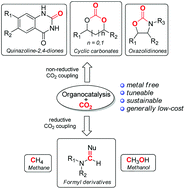The conversion of carbon dioxide (CO2), an abundant renewable carbon reagent, into chemicals of academic and industrial interest is of imminent importance to create a higher degree of sustainability in chemical processing and production. Recent progress in this field is characterised by a plethora of organic molecules able to mediate the conversion of suitable substrates in the presence of CO2 into a variety of value-added commodities with advantageous features combining cost-effectiveness, metal-free transformations and general substrate activation profiles. In this review, the latest developments in the field of CO2 catalysis are discussed with a focus on organo-mediated conversions and their increasing importance in serving as practicable alternatives for metal-based processes. Also a critical assessment of the state-of-the-art methods is presented with attention to those features that need further development to increase the usefulness of organocatalysis in the production of organic molecules of potential commercial interest.
